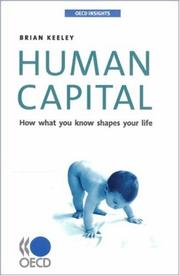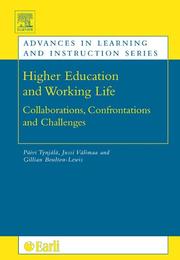| Listing 1 - 10 of 22 | << page >> |
Sort by
|
Book
ISBN: 3657771549 Year: 2012 Publisher: Paderborn : Verlag Ferdinand Schöningh,
Abstract | Keywords | Export | Availability | Bookmark
 Loading...
Loading...Choose an application
- Reference Manager
- EndNote
- RefWorks (Direct export to RefWorks)
Angesichts einer offenen Zukunft wird das, was nachwachsenden Generationen vermittelt werden soll, zu einem pädagogischen Problem. Wenn zukünftige Positionen in der Gesellschaft nicht vorhersehbar sind und Wissen sich ständig verändert, wird die Möglichkeit richtigen Handelns problematisch. Es soll Zukunft nicht verschließen und doch Begründungen für gegenwärtige Problemstellungen finden. Dies ist zumindest die Erwartung an pädagogisches Handeln. Drei unterschiedliche Begründungsversuche im Umgang mit diesem schwierigen Problem lassen sich unterscheiden. Man kann - erstens - die Identität oder Autonomie des Individuums in den Mittelpunkt pädagogischer Bemühungen stellen und hoffen, dass ein solches Individuum auch für eine offene Zukunft gerüstet ist. Man kann - zweitens - versuchen, die pädagogische Beziehung so zu bestimmen, dass ein nichtdeterminierender Einfluss möglich erscheint. Und man kann - drittens - auf die wissenschaftliche Geltung des vermittelten Wissens setzen. Alle drei Begründungsperspektiven auf einen Umgang mit der pädagogischen Problematik werden in der Konfrontation mit aktuellen Theorieangeboten überprüft.
education theory --- education and society --- education and employment
Digital
Year: 1832 Publisher: [Great Britain? s.n.
Abstract | Keywords | Export | Availability | Bookmark
 Loading...
Loading...Choose an application
- Reference Manager
- EndNote
- RefWorks (Direct export to RefWorks)
Book
ISBN: 9264047956 9264031758 Year: 2007 Publisher: Paris : OECD,
Abstract | Keywords | Export | Availability | Bookmark
 Loading...
Loading...Choose an application
- Reference Manager
- EndNote
- RefWorks (Direct export to RefWorks)
Welche Auswirkungen haben Bildung und Lernen auf unsere Gesellschaften und Volkswirtschaften? Wie lassen sich Ungleichheiten in der Bildung beseitigen? Und wie können wir gewährleisten, dass jeder Einzelne in allen Lebensphasen die Art von Lernmöglichkeit erhält, die ihm den größtmöglichen Nutzen bringt und durch die er sein Humankapital voll entfalten kann? Dieser Bericht erläutert die zunehmende Bedeutung des Humankapitals für den Einzelnen und für die Gesellschaft bei der Bewältigung des sozialen und wirtschaftlichen Wandels. Ferner wird untersucht, inwiefern es den Ländern gelingt, die Menschen Zeit ihres Lebens durch die Bereitstellung von Aus- und Weiterbildungsangeboten zu unterstützen.
Human capital. --- Labor supply --- Effect of education on. --- Education and employment --- Employment and education --- Human assets --- Human beings --- Human resources --- Economic value --- Education --- Capital
Book
ISBN: 342849461X 3428094611 3428794613 Year: 1998 Publisher: Berlin, Germany : Duncker & Humblot,
Abstract | Keywords | Export | Availability | Bookmark
 Loading...
Loading...Choose an application
- Reference Manager
- EndNote
- RefWorks (Direct export to RefWorks)
Das Thema Bildung und Wirtschaftswachstum hat Tradition. Während in den sechziger Jahren die Impulse direkt aus der Wachstumstheorie kamen, sind es heute zahlreiche Teilströmungen der Bildungsökonomie, die die Klammer zwischen Humanressourcen und Produktivitätswachstum neu beleben. Die in diesem Band zusammengefaßten Beiträge, die im Bildungsökonomischen Ausschuß 1996 in Mannheim präsentiert wurden, unternehmen den Versuch, das bisweilen etwas eklektische Wechselspiel zwischen Bildung und Wirtschaftswachstum durch einige institutionelle, empirische und theoretische Mosaiksteine weiterzuentwick
Education --- Labor supply --- Human capital. --- Economic aspects. --- Effect of education on. --- Human assets --- Human beings --- Human resources --- Capital --- Education and employment --- Employment and education --- Economic value
Digital
Year: 1831 Publisher: [S.l. s.n.
Abstract | Keywords | Export | Availability | Bookmark
 Loading...
Loading...Choose an application
- Reference Manager
- EndNote
- RefWorks (Direct export to RefWorks)

ISBN: 0309049350 9786610196067 1280196068 0309585740 0585142343 9780585142340 9780309049351 9781280196065 6610196060 9780309585743 Year: 1994 Publisher: Washington, D.C. National Academy Press
Abstract | Keywords | Export | Availability | Bookmark
 Loading...
Loading...Choose an application
- Reference Manager
- EndNote
- RefWorks (Direct export to RefWorks)
Career education --- Postsecondary education --- Federal aid to higher education --- Labor supply --- Education, Special Topics --- Education --- Social Sciences --- Government policy --- Effect of education on --- Effect of education on. --- Education and employment --- Employment and education
Book
ISBN: 0674974778 0674974794 9780674974791 9780674504653 0674504658 Year: 2017 Publisher: Cambridge, MA
Abstract | Keywords | Export | Availability | Bookmark
 Loading...
Loading...Choose an application
- Reference Manager
- EndNote
- RefWorks (Direct export to RefWorks)
For decades, top scientists in colleges and universities pursued a clear path to success: enroll in a prestigious graduate program, conduct research, publish papers, complete the PhD, pursue postdoctoral work. With perseverance and a bit of luck, a tenure-track professorship awaited at the end. In today’s academic job market, this scenario represents the exception. As the number of newly conferred science PhDs keeps rising, the number of tenured professorships remains stubbornly stagnant. Only 14 percent of those with PhDs in science occupy tenure-track positions five years after completing their degree. Next Gen PhD provides a frank and up-to-date assessment of the current career landscape facing science PhDs. Nonfaculty careers once considered Plan B are now preferred by the majority of degree holders, says Melanie Sinche. An upper-level science degree is a prized asset in the eyes of many employers, and a majority of science PhDs build rewarding careers both inside and outside the university. A certified career counselor with extensive experience working with graduate students and postdocs, Sinche offers step-by-step guidance through the career development process: identifying personal strengths and interests, building work experience and effective networks, assembling job applications, and learning tactics for interviewing and negotiating—all the essentials for making a successful career transition. Sinche profiles science PhDs across a wide range of disciplines who share proven strategies for landing the right occupation. Current graduate students, postdoctoral scholars, mentors, and students considering doctoral and postdoctoral training in the sciences will find Next Gen PhD an empowering resource.
Science --- Doctor of philosophy degree. --- Labor supply --- Education and employment --- Employment and education --- Education --- Ph. D. degree --- PhD degree --- Philosophy, Doctor of --- Degrees, Academic --- Science as a profession --- Scientists --- Vocational guidance. --- Effect of education on. --- Vocational guidance
Book
ISBN: 9073787041 Year: 1992 Publisher: Wageningen : Nederlands Instituut van Landbouwkundig Ingenieurs, Stichting Maatschappelijke Plaats Wageningse afgestudeerden,
Abstract | Keywords | Export | Availability | Bookmark
 Loading...
Loading...Choose an application
- Reference Manager
- EndNote
- RefWorks (Direct export to RefWorks)
Proefschrift. Met samenvatting in het Engels. Onderzoek naar verschillen tussen vrouwelijke en mannelijke afgestudeerden van de Landbouwuniversiteit Wageningen in 1988 ten aanzien van de kwaliteit van hun functies. Ingegaan wordt op de vraag hoe deze verschillen verklaard kunnen worden.
81.24 education and employment. --- 85.04 teaching, profession and organizations of business administration and organization science. --- Agricultural engineer. --- Agricultural university wageningen. --- Career. --- Men. --- Social Sciences and Humanities. Education -- Agricultural Education --- Women. --- Netherlands.

ISBN: 1281745766 9264048669 9786611745769 9264029095 9264029087 Year: 2007 Publisher: Paris : OECD,
Abstract | Keywords | Export | Availability | Bookmark
 Loading...
Loading...Choose an application
- Reference Manager
- EndNote
- RefWorks (Direct export to RefWorks)
This first book in the new OECD Insights Series examines the increasing economic and social importance of human capital - our education, skills, competencies, and knowledge. As economies in developed countries shift away from manufacturing, economic success for individuals and national economies is increasingly reliant on the quality of human capital. Raising human capital has emerged as a key policy priority, particularly for low-skilled individuals, who are at risk of being left even further behind. Policy in this area is focusing on early childhood development, improving quality and choice in schooling, creating excellence in tertiary education, and widening access to adult learning. Drawing on the research and analysis of the OECD, this dynamic new book uses straightforward language to explain how countries across the OECD area are responding to the challenge of raising their levels of human capital. This book includes Statlinks, URLs linking statistical tables and graphs in the text of the book to Excel spreadsheets showing the underlying data.
Human capital. --- Labor supply -- Effect of education on. --- Labor supply. --- Human capital --- Labor supply --- Labor & Workers' Economics --- Business & Economics --- Effect of education on --- Effect of education on. --- Education and employment --- Employment and education --- Human assets --- Human beings --- Human resources --- Economic value --- Education --- Capital

ISBN: 1281050180 9786611050184 0080478328 9780080478326 0080450202 9780080450209 Year: 2006 Publisher: Oxford ; New York : Elsevier,
Abstract | Keywords | Export | Availability | Bookmark
 Loading...
Loading...Choose an application
- Reference Manager
- EndNote
- RefWorks (Direct export to RefWorks)
Are higher education institutions preparing students for the working world?
Labor supply --- Business and education. --- Education, Higher. --- Continuing education. --- Lifelong education --- Lifelong learning --- Permanent education --- Recurrent education --- Education --- Adult education --- College students --- Higher education --- Postsecondary education --- Universities and colleges --- Corporations and education --- Industry and education --- Education and business --- Education and corporations --- Education and industry --- Worksite schools --- Education and employment --- Employment and education --- Effect of education on. --- Business and education --- Education, Higher --- Continuing education --- Effect of education on --- E-books
| Listing 1 - 10 of 22 | << page >> |
Sort by
|

 Search
Search Feedback
Feedback About UniCat
About UniCat  Help
Help News
News